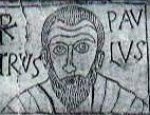Theological Anthropology and Ethics in Early Christianity
A Project of Department VI
Prof. Dr. Dr. h.c. mult. Gerd Theißen
Back at the time when the New Testament was being translated for the present with the help of existential interpretation, theological anthropology was the center of interest. During this period, early Christian ethics were seldom handled as an independent topic, because the existentially interpreted kerygma was to remain free of any "moralism," and the theological opposition of law and the gospel devaluated all early Christian norms. At that time, many exegetes made the historic judgment that early Christian ethics lacked originality. The heavy emphasis on theological anthropology paired with the neglect of ethics was the basis of a brilliant theological program, the demythologization program of R. Bultmann, which since then has made history. Because of the necessity for an independent reformulation and a continuation of this program, both themes need to be researched historically anew, as well as to be defined anew theologically. This project is based on the following central ideas:
1) The early Christian ethos is a synthesis of the Biblical commandment ethics and Greek insight ethics that were developed in Hellenistic Judaism. There is a specific early Christian ethos that is a further development of the Jewish ethos and that brought new impulses to the non-Jewish world. Two basic values, the love of one's neighbor and the relinquishment of status, are characteristic, with both deriving from the general tradition of the (simple) Jewish people. This has to do with a fellowship ethos of people placed on the same level. In early Christianity, in addition to these basic values having to do with one's fellow people, a "downward transfer" of the values of the upper class occurred concerning such things as power, possessions and wisdom.

Similar results are achieved when differentiating between two basic Pauline values: "corporate solidarity" and "other regard" (D. G. Horrell). The joining of these ideas leads to a distinctive Christian ethics that in its single elements has many analogies, but as a whole is unique. The subsequent history of European ethics has been characterized by a further development of the synthesis of the Biblical and Greek traditions. We have this synthesis to thank for the basic values that are still recognized today, such as autonomy and solidarity, rationality and compassion, judiciousness and altruism.
2) In theological-philosophical anthropology, we find a juxtaposition of the cognitivistic idea of humanity, which sees the will as dependent on insight, with the voluntaristic idea of humanity, which sees insight as dependent on the will. What is characteristic about humanity becomes especially clear when considering the human emotions as irrational forces (P. v. Gemünden) and the regulating entities, such as the conscience. There is a symbolic analogy: As the correct action results from the correct insight according to the consequent forms of the Greek insight ethics (of Socrates and the Stoa), so according to Paul the correct action results from the correct being. The difference between cognitivism and voluntarism should not be overlooked. Especially Paul's Letter to the Romans presents on the one hand a rejection of an existing anthropological consensus in antiquity (an orientation toward reason and Torah promises freedom and life), but on the other hand, the fulfillment of exactly this program is promised to the renewed person: the renewed reason and the Torah fulfilled by the new person give freedom and life. Ascetic ideals coming out of these traditions can be interpreted as programs of shaping and overcoming the world (T. Onuki). In early Christianity, the transforming power emanates from Christology. Analogous to the existential interpretation, this power needs to be enlightened with theological anthropological (including also psychological) categories. Above all, this will be shown by an interpretation of the Letter to the Romans (P. v. Gemünden/G. Theißen).
3) The two traditions examined here are somewhat paralleled by universal (liberal) discourse ethics and communitarianism today. In light of this contemporary discussion, above all D. G. Horrell has presented a new interpretation of Pauline ethics, according to which Paul emerges as a "liberal communitarianist." With the connection of this interpretation to the present, a discussion with systematic theology and ethics is needed.
4) Before the backdrop of these observations, Paul's letter to the Romans can be read as including various ethical perspectives. This may help to overcome the current exegetical situation, in which two traditions - the Reformation's focus on the individual or New Perspective's focus on the social dimension - are dominant. Petra von Gemünden (Augsburg) and Gerd Theißen (Heidelberg) are working on a monography on the Letter to the Romans, in which they wish to show that it should be read
- with the help of a semantic approach (Paul's use of metaphors)
- by analysing the various discourses in which Paul stands (i.e. four different concepts of salvation, depending on his discussion partner in contemporary Judaism und Paganism)
- with the help of a psychological approach that links Paul's four concepts of salvation to his biography
- by developing the social focus of the New Perspective further: Paul hoped when returning to Jerusalem that the temple would be openend for the nations.
The different perspectives show that Paul's critique of the law varies. This explains the inconsistencies, but should not lead to relativizing it, but instead shows its high importance.

